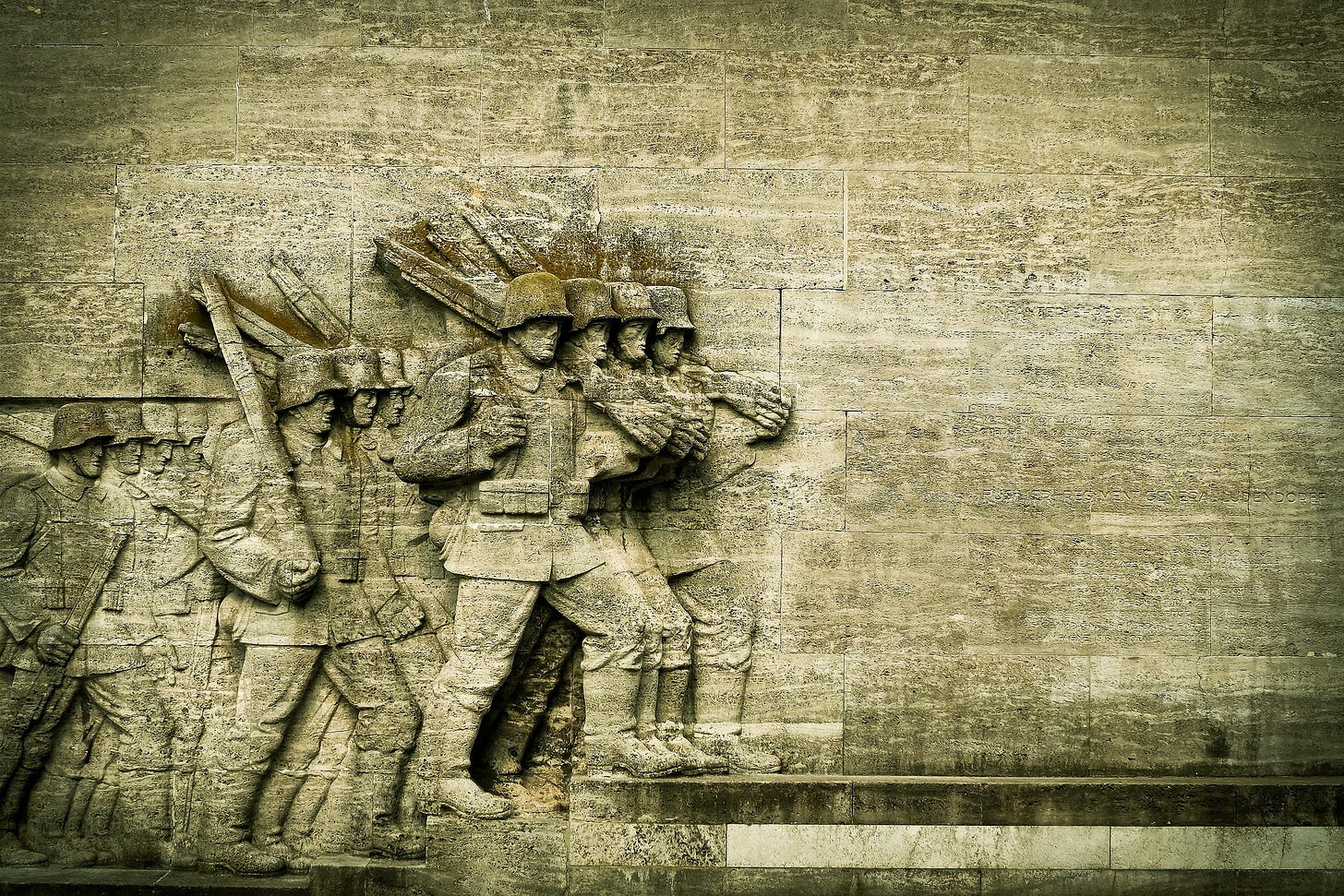Just War in an Unjust World (1)
Catholic Teaching and Modern Warfare
Since the horrors of the Second World War, the Catholic Church has certainly developed her way of talking about war. Since Pius XII, the Church has clearly taught that wars of aggression are always immoral
Only defensive war may be morally allowed. But even that must meet very strict conditions, often called the "just war" criteria (Compendium of the Social Doctrine of the Church, 500). These include:
The harm being defended against must be real, serious, and certain.
All peaceful solutions must have been tried first.
There has to be a real chance of success.
The violence used must not cause worse harm than what it tries to stop
That’s a very high bar. And in today’s world, the Church seems to be saying: it's almost never met.
Pope Francis about War Today
Pope Francis, in Fratelli tutti, recognizes these traditional just war conditions. But he’s also clear that they’re often stretched or misused. Too often, powerful nations twist the rules to justify "pre-emptive" attacks—going to war based on fear of what another country might do. That kind of reasoning is not acceptable to the Church (Compendium of the Social Doctrine of the Church, 501).
Francis puts it plainly:
“The truth is that ‘never has humanity had such power over itself, yet nothing ensures that it will be used wisely.’ We can no longer think of war as a solution, because its risks will probably always be greater than its supposed benefits. In view of this, it is very difficult nowadays to invoke the rational criteria elaborated in earlier centuries to speak of the possibility of a ‘just war’”. (Fratelli tutti, 258)
That line strikes at the heart of the issue. In the modern world, war is too dangerous, too damaging, and too likely to spin out of control.
Why the Just War Tradition Isn’t Wrong—but It’s Rarely Enough
The just war tradition goes back to important saints and Christian thinkers like Augustine and Aquinas. In their time, wars were smaller, more contained and, above all, weapons were much less destructive. Aquinas even thought war could sometimes be used not just to defend but to punish wrongdoing and restore justice.
But the Church’s view has matured. Since Pope Pius XII, the Church has firmly rejected any idea of aggressive war. Why? Because history shows that such wars don't bring peace—they bring chaos. The devastation wrought by aggressive wars in the twentieth and twenty-first centuries has confirmed the wisdom of this rejection.
New Weapons, Old Victims
Modern war is unlike anything in the past. Bombs that flatten cities, drones that kill from a continent away, and chemical or nuclear weapons that could wipe out whole populations.
Modern warfare, shaped by technological advancement, causes serious moral problems since the development of nuclear, chemical, and biological weapons has given war “an uncontrollable destructive power over great numbers of innocent civilians” (Fratelli tutti, 258).
New forms of warfare—like drone strikes or AI-powered weapons—may sound cleaner or smarter. But they come with serious moral dangers. These tools can make it too easy to kill. They distance soldiers from the violence they inflict, as if it was all a videogame.
The Church teaches that violence must never cause more harm than it prevents. But in today’s conflicts, that’s nearly impossible. Civilian deaths are almost guaranteed, no matter how “precise” the weapons claim to be. What we find on the news on a daily basis is a bitter confirmation of this.
Proportionality and Discrimination
One of the core ideas in just war thinking is proportionality—making sure the response to violence doesn’t go too far. But some thinkers today argue that proportionality is so hard to define that it can justify almost anything.
That’s a dangerous road. The Church reminds us that proportionality must protect human dignity, not just weigh military success against potential losses. If a theory justifies the deaths of innocents in the name of strategy, then it has lost its moral compass.
The Church insists also on the criterion of discrimination: the requirement that combatants distinguish between legitimate military targets and non-combatants. But modern weapons, with their immense power, make that harder and harder to do.
A Call to Peace
So, does the Church reject the idea of just war? No. But she does call us to look at war with clearer eyes and much realism. The conditions for a just war still exist in theory—but we should not be quick to think that they can easily be met in practice. And we should be honest about that.
The Gospel always points toward peace. As disciples of Christ, we are called to be peacemakers. In our world of high-tech violence, hardened hearts and widespread indifference, that calling has never been more urgent.
This is the first piece of a series of three articles on contemporary Church teaching on armed conflicts and just war.
Picture from Pixabay





Thank you for laying out this important topic so well. Looking forward to the whole series!